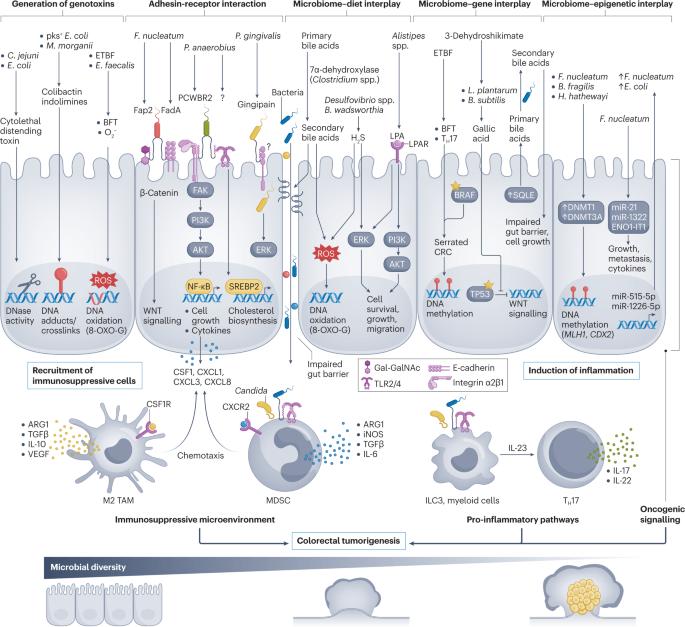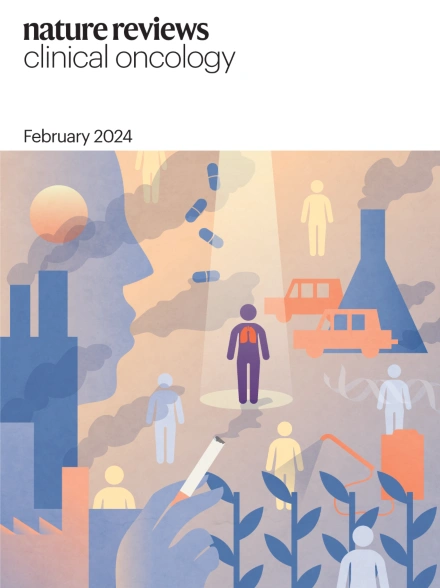Gut microbiota in colorectal cancer development and therapy
IF 81.1
1区 医学
Q1 ONCOLOGY
引用次数: 10
Abstract
Colorectal cancer (CRC) is one of the commonest cancers globally. A unique aspect of CRC is its intimate association with the gut microbiota, which forms an essential part of the tumour microenvironment. Research over the past decade has established that dysbiosis of gut bacteria, fungi, viruses and Archaea accompanies colorectal tumorigenesis, and these changes might be causative. Data from mechanistic studies demonstrate the ability of the gut microbiota to interact with the colonic epithelia and immune cells of the host via the release of a diverse range of metabolites, proteins and macromolecules that regulate CRC development. Preclinical and some clinical evidence also underscores the role of the gut microbiota in modifying the therapeutic responses of patients with CRC to chemotherapy and immunotherapy. Herein, we summarize our current understanding of the role of gut microbiota in CRC and outline the potential translational and clinical implications for CRC diagnosis, prevention and treatment. Emphasis is placed on how the gut microbiota could now be better harnessed by developing targeted microbial therapeutics as chemopreventive agents against colorectal tumorigenesis, as adjuvants for chemotherapy and immunotherapy to boost drug efficacy and safety, and as non-invasive biomarkers for CRC screening and patient stratification. Finally, we highlight the hurdles and potential solutions to translating our knowledge of the gut microbiota into clinical practice. Emerging data indicate a central role for the microbiota in all aspects of colorectal cancer (CRC). Despite this general consensus, understanding the role of specific components of the microbiota in such a way that enables the development of clinical interventions or tools to inform clinical decision-making has thus far proved challenging. In this Review, the authors summarize the role of the microbiota in CRC, including in prevention, in interactions with treatment and as a source of novel biomarkers.

大肠癌发病和治疗中的肠道微生物群
大肠癌(CRC)是全球最常见的癌症之一。CRC 的独特之处在于它与肠道微生物群密切相关,而肠道微生物群是肿瘤微环境的重要组成部分。过去十年的研究证实,肠道细菌、真菌、病毒和古细菌的菌群失调伴随着结直肠肿瘤的发生,而这些变化可能是致病因素。机理研究数据表明,肠道微生物群能够通过释放多种代谢产物、蛋白质和大分子,与宿主的结肠上皮和免疫细胞相互作用,从而调节结肠直肠癌的发展。临床前证据和一些临床证据也强调了肠道微生物群在改变 CRC 患者对化疗和免疫疗法的治疗反应中的作用。在此,我们总结了我们目前对肠道微生物群在 CRC 中作用的理解,并概述了其对 CRC 诊断、预防和治疗的潜在转化和临床影响。重点是现在如何更好地利用肠道微生物群,开发有针对性的微生物疗法,作为结直肠肿瘤发生的化学预防剂,作为化疗和免疫疗法的辅助剂以提高药物疗效和安全性,以及作为用于 CRC 筛查和患者分层的非侵入性生物标志物。最后,我们强调了将肠道微生物群知识转化为临床实践的障碍和潜在解决方案。新出现的数据表明,微生物群在结直肠癌(CRC)的各个方面都发挥着核心作用。尽管已达成普遍共识,但迄今为止,要了解微生物群特定成分的作用,以便开发临床干预措施或工具,为临床决策提供依据,仍具有挑战性。在这篇综述中,作者总结了微生物群在 CRC 中的作用,包括在预防、与治疗的相互作用以及作为新型生物标记物的来源等方面的作用。
本文章由计算机程序翻译,如有差异,请以英文原文为准。
求助全文
约1分钟内获得全文
求助全文
来源期刊
CiteScore
99.40
自引率
0.40%
发文量
114
审稿时长
6-12 weeks
期刊介绍:
Nature Reviews publishes clinical content authored by internationally renowned clinical academics and researchers, catering to readers in the medical sciences at postgraduate levels and beyond. Although targeted at practicing doctors, researchers, and academics within specific specialties, the aim is to ensure accessibility for readers across various medical disciplines. The journal features in-depth Reviews offering authoritative and current information, contextualizing topics within the history and development of a field. Perspectives, News & Views articles, and the Research Highlights section provide topical discussions, opinions, and filtered primary research from diverse medical journals.

 求助内容:
求助内容: 应助结果提醒方式:
应助结果提醒方式:


